Equations, Example Solved Problem | Coordinate Geometry - Straight line | 10th Mathematics : UNIT 5 : Coordinate Geometry
Chapter: 10th Mathematics : UNIT 5 : Coordinate Geometry
Straight line
Straight line
Any first degree equation in two variables x and y of the
form ax + by +c = 0 …(1) where a, b,
c are real numbers and at least one of a, b is non-zero is
called “Straight line” in xy plane.
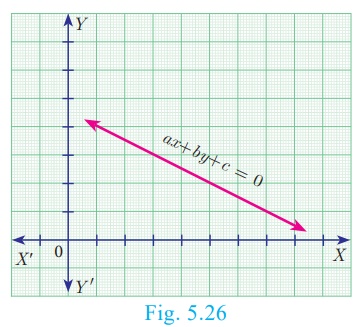
1. Equation of coordinate axes
The X axis and Y axis together are called coordinate
axes. The x coordinate of every point on OY (Y axis) is 0.
Therefore equation
of OY (Y axis) is x = 0 (fig 5.27)
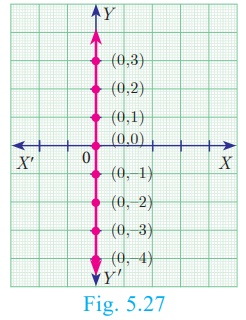
The y coordinate of every point on OX (X
axis) is 0. Therefore the equation of OX
(X axis) is y = 0 (fig 5.28)
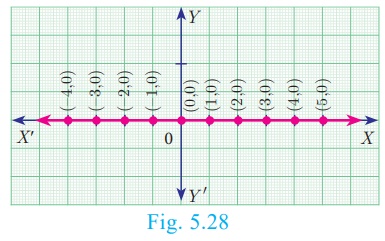
2. Equation of a straight line parallel to X axis
Let AB be a straight line parallel to X axis, which is at a distance ‘b’. Then y
coordinate of every point on ‘AB’ is ‘b’. (fig 5.29)
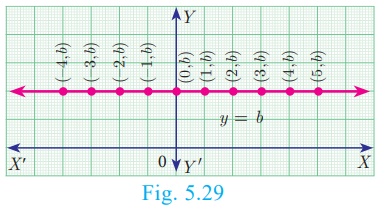
Therefore, the equation of AB is y = b
Note
·
If b > 0 , then the line y=b lies above the X
axis
·
If b < 0 , then the line y=b lies below the X
axis
·
If b = 0 , then the line y=b is the X axis
itself.
3. Equation of a Straight line parallel to the Y axis
Let CD be a straight line parallel to Y axis, which is at a distance ‘c’. Then x coordinate of every point on CD is ‘c’. The
equation of CD is x = c. (fig 5.30)
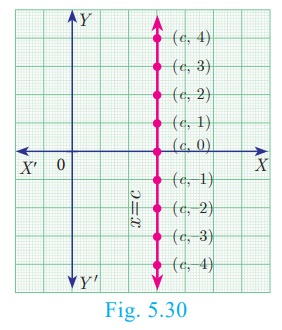
Note
·
If c>0, then the line x=c lies right to the
side of the Y axis
·
If c < 0, then the line x=c lies left to
the side of the Y axis
·
If c=0, then the line x=c is the Y axis
itself.
Example 5.17
Find the
equation of a straight line passing through (5,7) and is (i) parallel
to X axis
(ii) parallel to Y axis.
Solution
(i) The equation of any straight line parallel to X axis is
y=b.
Since it passes through (5,7), b = 7.
Therefore, the required equation of the line is y=7.
(ii) The equation of any straight line parallel to Y axis
is x=c
Since it passes through (5,7), c = 5
Therefore, the required equation of the line is x=5.
4. Slope-Intercept Form
Every straight line that is not vertical will cut the Y
axis at a single point. The coordinate of this point is called y
intercept of the line.
A line with slope m and y intercept c can be expressed
through the equation y=mx+c We call this equation as the slope-intercept form of the equation of a
line.
Note
·
If a line with slope m, m≠0 makes x
intercept d, then the equation of the straight line is y = m (x–d).
·
y = mx represent equation of a straight line with slope
m and passing through the origin.
Example 5.18
Find the equation of a straight line whose
(i) Slope is 5 and y intercept is -9
(ii) Inclination is 45° and y intercept is 11
Solution
(i) Given, Slope = 5, y intercept, c = −9
Therefore, equation of a straight line is y = mx +c
y = 5x − 9 gives 5x − y
− 9 = 0
(ii) Given, θ = 45° , y intercept, c = 11
Slope m = tan θ = tan 45° = 1
Therefore, equation of a straight line is of the form y = mx
+c
Hence we get, y= x + 11 gives x − y
+ 11 = 0
Example 5.19
Calculate the slope and y intercept of the straight line 8x − 7y + 6 = 0
Solution
Equation of the given straight line is 8x − 7y + 6 = 0
7y = 8x + 6 (bringing it to the form y
= mx +c )
y = 8/7 x + 6/7 …(1)
Comparing (1) with y = mx +c
Slope m = 8/7 and y intercept c = 6/7
Example 5.20
The graph relates temperatures y (in Fahrenheit degree) to temperatures x (in Celsius degree) (a)
Find the slope and y intercept (b) Write an equation of the line What is
the mean temperature of the earth in Fahrenheit degree if its mean temperature
is 25° Celsius?
Solution
(a) From the figure, slope = 
The line crosses the Y axis at (0, 32) So
the slope is 9/5 and y intercept is 32.
(b) Use the slope and y intercept to write an equation
The equation is y = 9/5 x + 32
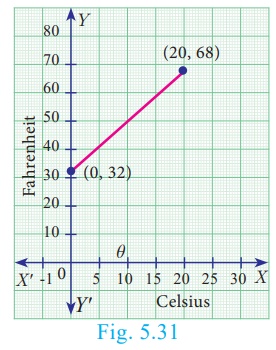
(c) In Celsius, the mean temperature of the earth is 25°. To find
the mean temperature in Fahrenheit, we find the value of y when x
= 25
y = 9/5 x + 32
y = 9/5 (25)+32
y = 77
Therefore, the mean temperature of the earth is 77° F.
Note
The formula for converting Celsius to Fahrenheit is given by F
= 9/5 C + 32. which is the linear equation representing a stragiht
line derived in the example.
5. Point-Slope form
Here we will find the equation of a straight line passing through
a given point A(x1 , y1 ) and having
the slope m.
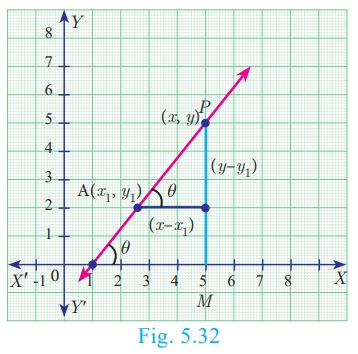
Let P (x, y) be any point other than A
on the given line. Slope of the line joining A(x1 , y1
) and P (x, y) is given by

Therefore, the equation of the required line is y − y1 = m (x − x1 ) (Point slope form)
Example 5.21
Find the
equation of a line
passing through the point (3, - 4) and having slope -5/7
Solution
Given, (x1 ,y1 ) = (3,
−4) and m = −5/7
The equation of the point-slope form of the straight line is y
− y1 = m (x − x1)
we write it as y + 4 = −
5/7 (x-3)
gives us 5x + 7y + 13 = 0
Example 5.22
Find the equation of a line passing through the point A(1, 4) and perpendicular to the
line joining points (2, 5) and (4, 7) .
Solution
Let the given points be A(1, 4) , B(2, 5) and C(4,
7).
Slope of line BC = (7–5)/(4-2) = 2/2 = 1
Let m be the slope of the required line.
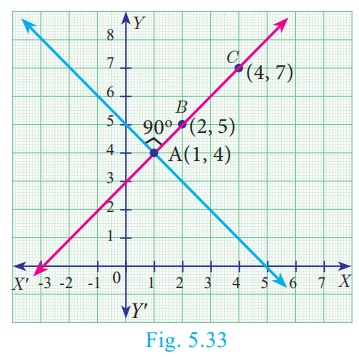
Since the required line is perpendicular to BC,
m ×1 = −1
m = −1
The required line also pass through the point A(1,4).
The equation of the required straight line is y − y 1
= m (x − x1 )
y- 4 =−1(x −1)
y- 4= −x + 1
we get, x + y – 5 = 0
6. Two Point form
Let A(x1 , y1 )
and B (x2 , y2 ) be two given
distinct points. Slope of the straight line passing through these points
is given by m = 
From the equation of the straight line in point slope form, we get
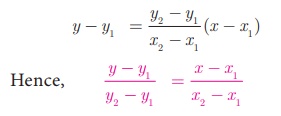
(is the equation of the line in two-point form)
Example 5.23
Find the equation of a straight line passing through (5, - 3) and (7, - 4) .
Solution
The equation of a straight line passing through the two points (x 1 , y1 ) and (x 2 , y2 ) is

Substituting the points we get,

Gives 6y + 2 = − x + 5
Therefore, x + 2y + 1 = 0
Example 5.24
Two buildings of different heights are located at opposite sides
of each other. If a heavy rod is attached joining the terrace of the buildings
from (6, 10) to (14, 12) , find the equation of the rod joining the buildings ?
Solution
Let A(6, 10) , B(14, 12) be the points denoting the terrace of the buildings.
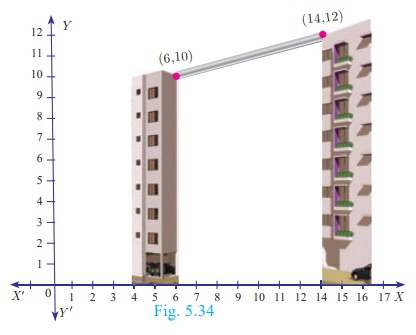
The equation of the rod is the equation of the straight line
passing through A(6,10) and B(14,12)

Therefore, x − 4y + 34 = 0
Hence, equation of the rod is x − 4y + 34 = 0
7. Intercept Form
We will find the equation of a line whose intercepts are a and
b on the coordinate axes respectively.
Let PQ be a line meeting X axis at A and Y
axis at B . Let OA=a, OB=b. Then the
coordinates of A and B are (a , 0) and (0,b)
respectively. Therefore, the equation of the line joining A and B
is
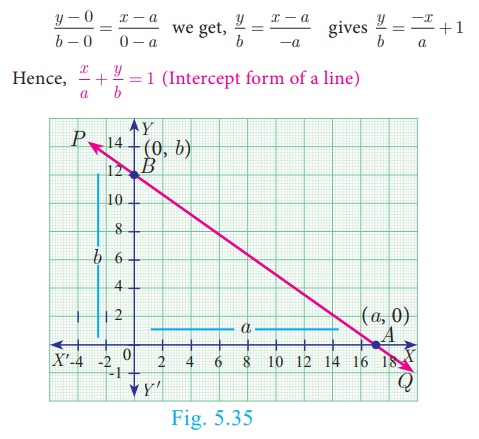
Example 5.25
Find the equation of a line which passes through (5,7) and makes intercepts on the axes equal in
magnitude but opposite in sign.
Solution
Let the x intercept be ‘a’ and y intercept be
‘–a’.
The equation of the line in intercept form is 

Therefore, x − y = a ...(1)
Since (1) passes through(5,7)
Therefore, 5 - 7 = a gives a = −2
Thus the required equation of the straight line is x − y
= −2 ; or x − y + 2 = 0
Example 5.26
Find the intercepts made by the line 4x − 9y + 36 = 0 on the coordinate axes.
Solution
Equation of the given line is 4x − 9y + 36 = 0
we write it as 4x - 9y = −36 (bringing it to the
normal form)
Dividing by -36 we get,  ...(1)
...(1)
Comparing (1) with intercept form, we get x intercept a = − 9 ; y
intercept b = 4
Example 5.27
A mobile phone is put to use when the battery power is 100%. The
percent
of battery power ‘y’
(in decimal) remaining after using the mobile phone for x hours is
assumed as y = −0. 25x + 1
(i) Draw a graph of the equation.
(ii) Find the number of hours elapsed if the battery power is 40%.
(iii) How much time does it take so that the battery has no power?
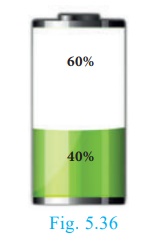
Solution
(i) 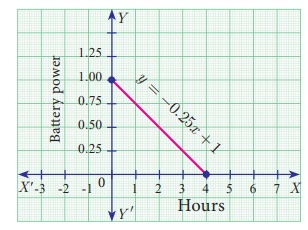
(ii) To find the time when the battery power is 40%, we have to
take y = 0. 40
0.40 = −0. 25x + 1
gives 0. 25x = 0. 60
we get, x = 0.60/0.25 = 2.4 hours.
(iii) If the battery power is 0 then y = 0
Therefore, 0 = −0.25x + 1 gives 0.25x = 1 hence x
= 4 hours.
Thus, after 4
hours, the battery of the mobile phone will have no
power.
Example 5.28
A line makes positive intercepts on coordinate axes whose sum is 7
and it
passes through (-3, 8) .
Find its equation.
Solution
If a and b are the intercepts then a + b
= 7 or b = 7 −a
By intercept form x/a + y/b = 1 ...(1)
We have x/a + y/(7−a) = 1
As this line pass through the point (-3, 8) , we have
−3/a + 8/(7 – a) = 1 gives –3(7–a) + 8a = a(7–a)
− 21 + 3a + 8a
= 7a −a2
So, a 2 + 4a − 21
= 0
Solving this equation (a − 3)(a + 7) = 0
a = 3 or a = −7
Since a is positive, we have a = 3 and b = 7–a
= 7–3 =4.
Hence x/3 + y/4 = 1
Therefore, 4x + 3y −12 = 0 is the required equation.
Example 5.29
A circular garden is bounded by East Avenue and Cross Road. Cross Road intersects North Street at D and East Avenue at E. AD is tangential to the circular garden at A(3, 10). Using the figure.
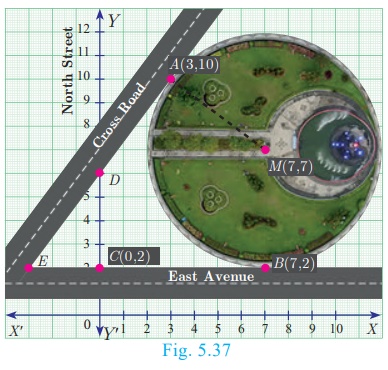
(a) Find the equation of
(i) East Avenue.
(ii) North Street
(iii) Cross Road
(b) Where does the Cross Road intersect the
(i) East Avenue ?
(ii) North Street ?
Solution
(a) (i) East Avenue is the straight line joining C(0, 2) and B(7, 2) . Thus the equation of East Avenue
is obtained by using two-point form which is
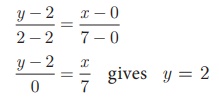
(ii) Since the point D lie vertically above C(0, 2)
. The x coordinate of D is 0.
Since any point on North Street has x coordinate value 0.
The equation of North Street is x = 0
(iii) To find equation of Cross Road.
Center of circular garden M is at (7, 7), A is (3,
10) We
first find slope of MA, which we call m1
Thus m1 = (10 −7) / (3-7) = −3/4.
Since the Cross Road is perpendicular to MA, if m2
is the slope of the Cross
Road then, m1m2
= −1 gives −3/4 m2 = −1 so m2 =
4/3.
Now, the cross road has slope 4/3 and it passes through the point A(
3, 10).
The equation of the Cross Road is y − 10 = 3/4 (x −
3)
3y − 30 = 4x −12
Hence, 4x − 3y + 18 = 0
(b) (i) If D is (0, k) then D is a point on
the Cross Road.
Therefore, substituting x = 0 , y = k in the
equation of Cross Road,
we get, 0 − 3k + 18 = 0
Value of k = 6
Therefore, D is (0, 6).
(ii) To find E, let E be (q , 2)
Put y = 2 in the equation of the Cross Road,
we get, 4q − 6 + 18 = 0
4q = −12 gives q = –3
Therefore, The point E is (-3, 2)
Thus the Cross Road meets the North Street at D(0, 6) and
East Avenue at E (-3, 2) .
Related Topics